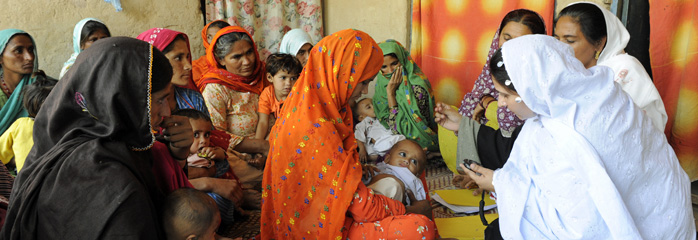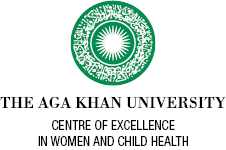Impact

For over a decade, the outreach and
research programmes of the Centre of Excellence in Women and Child
Health have been working to improve the health of women and children in
Pakistan - this agenda is consonant with that of the University as well
as of the Health Department of Pakistan. We are proud of the impact of
our hard work on improving the lives of women and children, particularly
in the communities.
The Centre has always worked to create
synergies among the various stakeholders, including Ministry of Health,
National Program for Family Planning and Primary Healthcare (LHW
Programme), Expanded Program on Immunization (EPI), Maternal, Newborn
and Child Health Program (MNCH), federal, provincial and local district
administrations and health authorities.
The following outlines some of the research of the Centre that has been instrumental in creating our impact in Pakistan.
National Nutrition Survey of Pakistan 2011:
Policy level decisions have been made in light of the National
Nutrition Survey conducted for better health statuses. This was the
largest national nutrition survey conducted in the country in terms of
sample size. Political will has been sought to include RMNCH as an
important agenda item in political parties mandates.
Impact of introduction of the Hib Vaccine in Pakistan: The
Hib Vaccine was introduced in South East Asia, and Pakistan was the
first country to implement its use largely because of our demonstration
of its impact.
Applicant of Chlorhexidine on umbilical cord to reduce neonatal infections and mortality:
The results of our study are being used to scale this up and possibly
make this part of the standard LHW care for reducing neonatal infections
and mortality at the community level in Pakistan.
Global Action Plan on Diarrhea and Pneumonia: Resulted in the World Health Organization altering its global strategy to address Diarrhea and Pneumonia management.
Pneumococcal Vaccine Study: Resulted in inclusion of Pneumococcal vaccine in the standard immunization programme of Pakistan.
Research Capacity Development Programme:
Provides faculty and staff with opportunities to develop their
capacities in research and grant writing at the national level in
Pakistan.
Management of Pneumonia at the community level:
This study successfully proved that childhood pneumonia can be managed
by trained Lady Health Workers at the community level thus reducing
childhood mortality due pneumonia - one of the biggest killers of
children. The Health Ministry is planning to make this part of the
standard LHW Programme in near future.
So it is not just research…it is also support
and encouragement to the communities, both economically and in the
quality of life and care of the women and children of Pakistan and
abroad.


